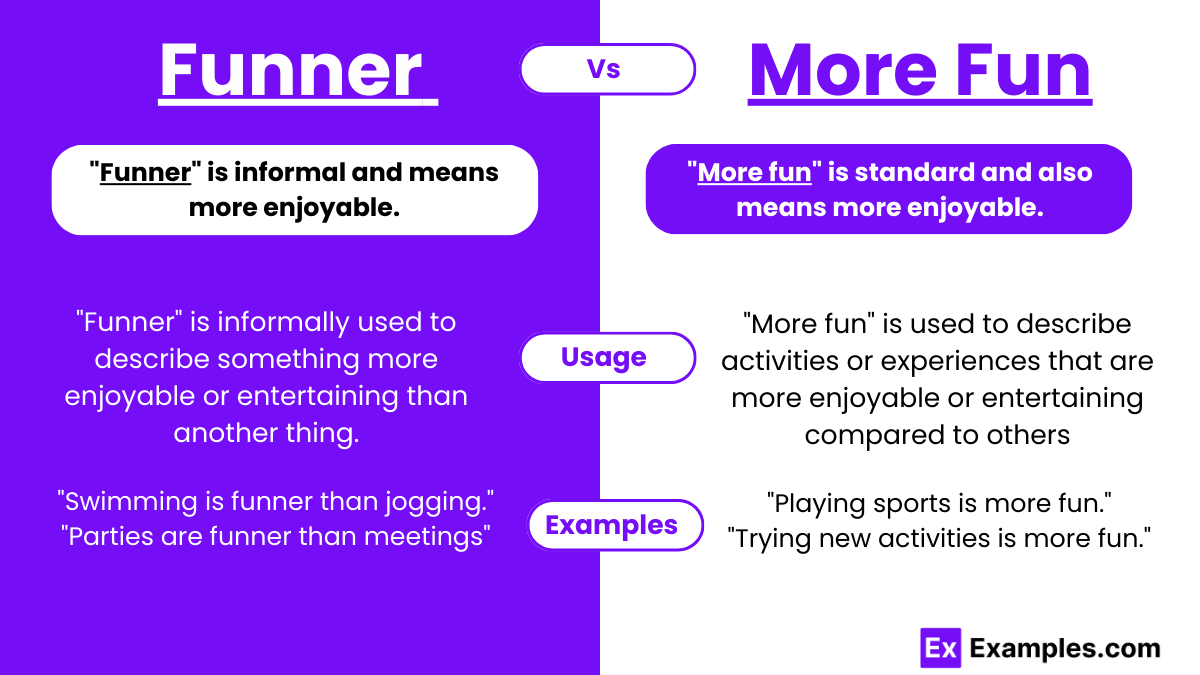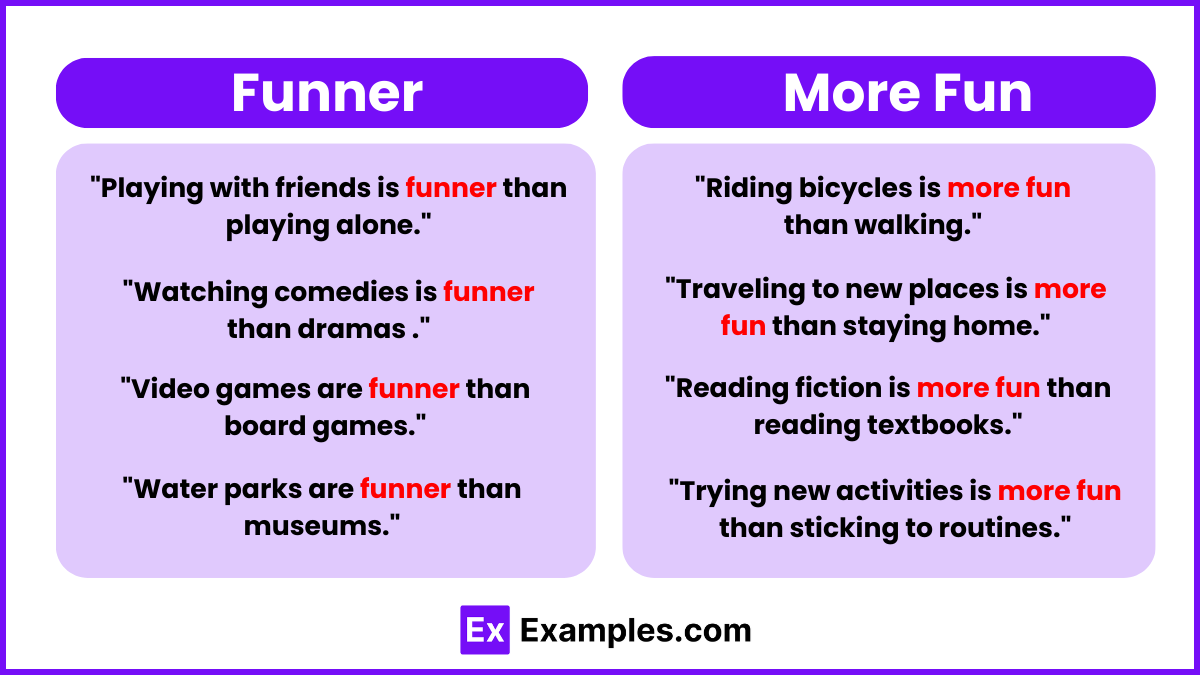Funner vs More Fun
In the colorful landscape of language, few debates spark as much intrigue and amusement as the comparison between “funner” and “more fun.” These two playful contenders vie for supremacy in expressing the sheer delight and enjoyment of experiences. As students navigate the labyrinth of grammar rules and linguistic nuances, deciphering when to employ each term becomes a whimsical yet enlightening pursuit. Whether it’s a casual conversation among friends or a formal essay for academic submission, the choice between “funner” and “more fun” embodies the essence of linguistic evolution and personal expression.
At first glance, the distinction between “funner” and “more fun” may seem trivial, yet their usage carries profound implications for language clarity and precision. While “funner” thrives in informal settings, injecting spontaneity and vivacity into everyday speech, “more fun” upholds the standards of formal grammar, offering a polished alternative for those inclined toward traditional expressions. In this article, we embark on a delightful journey through examples and explanations, delving into the delightful nuances of “funner” and “more fun” to empower students with the linguistic finesse needed to navigate the playful intricacies of English language expression.
Funner and More Fun – Meanings
Funner: “Funner” is an informal comparative adjective used to convey a higher degree of enjoyment or amusement compared to something else. It is colloquially employed to describe experiences, activities, or objects that provide greater fun or entertainment. While not universally accepted in formal writing, “funner” thrives in casual conversations and informal contexts, injecting a sense of playfulness and spontaneity into language usage.
More Fun: “More fun” is a comparative phrase used to denote a greater level of enjoyment or amusement in comparison to something else. It adheres to traditional grammar rules and is widely accepted in both formal and informal contexts. “More fun” is a standard alternative to the informal “funner” and is commonly used to describe experiences, events, or activities that offer heightened enjoyment or entertainment.
Summary
“Funner” and “more fun” both convey a heightened sense of enjoyment or amusement compared to something else. While “funner” is informal and thrives in casual conversations, “more fun” adheres to traditional grammar rules and is widely accepted in formal and informal contexts alike. Both terms inject playfulness and spontaneity into language usage, enriching communication with vibrant expressions of delight and entertainment.
Difference Between Funner and More Fun
Exploring the nuances between “funner” and “more fun” sheds light on their distinct roles in expressing enjoyment. Let’s delve into their differences through a comparative analysis.
| Aspect | Funner | More Fun |
|---|---|---|
| Formality | Informal usage in casual conversations. | Adheres to traditional grammar rules. |
| Acceptance | Less widely accepted in formal writing. | Widely accepted in both formal and informal contexts. |
| Comparative Form | Comparative adjective. | Comparative phrase. |
| Usage Context | Thrives in colloquial and informal settings. | Suitable for various linguistic contexts. |
| Spontaneity | Injects playfulness and spontaneity into language. | Offers a standard alternative without compromising clarity. |
| Language Evolution | Reflects evolving language trends. | Maintains adherence to traditional grammar rules. |
| Linguistic Freedom | Allows for creative expression and informal communication. | Balances between informal and formal language usage. |
| Informal Setting | Commonly used in casual conversations among friends. | Provides a relaxed yet grammatically correct expression. |
| Tone | Conveys a sense of informality and familiarity. | Retains a level of formality suitable for diverse audiences. |
| Usage Frequency | Less frequent in formal or academic writing. | More commonly used in various written and spoken contexts. |
Examples of Funner and More Fun
Exploring examples of “funner” and “more fun” elucidates their distinct roles in expressing enjoyment. Let’s delve into specific instances where each term is aptly employed.
Examples of Funner:
- Roller coasters are funner than merry-go-rounds.
- Swimming is funner than sitting indoors.
- Playing with friends is funner than being alone.
- Watching comedies is funner than dramas.
- Video games are funner than board games.
Examples of More Fun:
- Going to the amusement park is more fun than staying home.
- Traveling to new places is more fun than staying in one city.
- Participating in outdoor activities is more fun than indoor ones.
- Attending parties is more fun than studying alone.
- Eating ice cream is more fun than counting calories.
When to Use Funner and More Fun
Understanding the appropriate usage of “funner” and “more fun” enhances language precision and clarity. Let’s delineate the contexts in which each term is aptly employed.
Usage of “Funner”:
- Informal Conversations: Utilize “funner” in casual discussions or colloquial settings among friends or family.
- Creative Writing: Employ “funner” in imaginative or informal writing to convey a playful tone.
- Spontaneous Speech: Choose “funner” when speaking informally to express comparative enjoyment casually.
Usage of “More Fun”:
- Formal Writing: Reserve “more fun” for formal documents, academic papers, or professional correspondence.
- Educational Settings: Opt for “more fun” in educational contexts to adhere to standard grammar and clarity.
- Public Speaking: Use “more fun” in speeches or presentations for grammatical correctness and professionalism.
Tips for Funner and More Fun
Here are the tips for “Funner” and “More Fun”:
- Consider Context: Assess the formality of the situation before choosing between “funner” and “more fun.”
- Informal Settings: Use “funner” in casual conversations among friends or in relaxed environments.
- Formal Settings: Opt for “more fun” in formal writing, academic papers, or professional communication.
- Creative Expression: Employ “funner” in creative writing to add a playful and spontaneous tone.
- Grammatical Correctness: Choose “more fun” to adhere to standard grammar rules, particularly in written communication.
- Audience Awareness: Consider your audience’s familiarity with informal language when deciding between the two terms.
- Clarity and Precision: Use “more fun” when striving for clarity and precision in language expression, especially in educational or professional contexts.
- Personal Preference: Ultimately, the choice between “funner” and “more fun” may depend on personal style and the desired tone of communication.
FAQs
Why Do We Say More Fun Instead of Funner?
“More fun” is preferred in formal language due to grammatical rules. It conforms to comparative adjective standards, offering clarity and precision in communication, especially in written contexts like academic papers or professional correspondence.
Is it OK to Say Funner?
While “funner” is commonly used in informal speech, it’s not universally accepted in formal writing. It lacks grammatical adherence, making “more fun” the preferred choice for clarity and correctness in academic or professional settings.
When Did Funner Become an Official Word?
“Funner” evolved as informal slang and gained usage over time. However, it hasn’t been universally recognized as an official word in formal dictionaries or language standards, remaining colloquial rather than grammatically sanctioned.
Is Funner Grammatically Correct?
While “funner” is widely used in casual speech, it’s considered grammatically incorrect in formal writing. It deviates from standard comparative adjective structures, making “more fun” the grammatically correct choice for precision and clarity in language expression.





